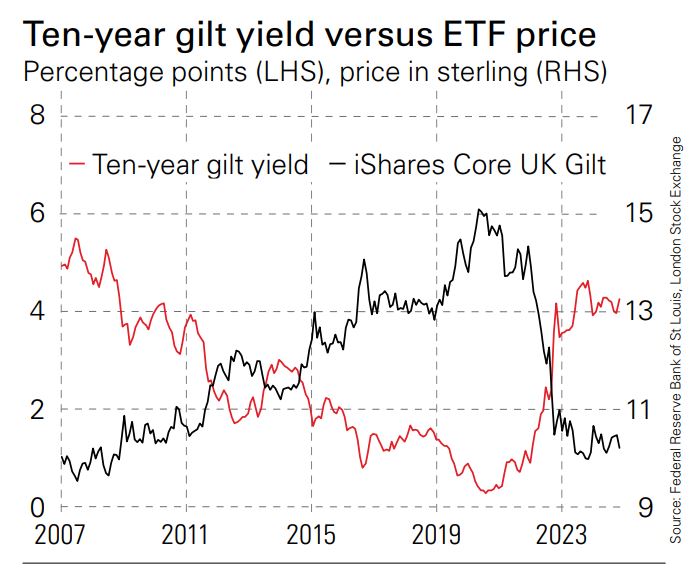How to invest in bond ETFs
Bond funds don’t behave like individual bonds. Target maturity ETFs can solve that problem


Get the latest financial news, insights and expert analysis from our award-winning MoneyWeek team, to help you understand what really matters when it comes to your finances.
You are now subscribed
Your newsletter sign-up was successful
Want to add more newsletters?

Twice daily
MoneyWeek
Get the latest financial news, insights and expert analysis from our award-winning MoneyWeek team, to help you understand what really matters when it comes to your finances.

Four times a week
Look After My Bills
Sign up to our free money-saving newsletter, filled with the latest news and expert advice to help you find the best tips and deals for managing your bills. Start saving today!
The return you get when buying a bond and holding it to maturity is set at the outset: it’s the yield to maturity when you buy. Yet the market value of the bond between now and maturity can vary greatly as short-term and long-term interest rates change. Investing in a bond fund, which holds a portfolio of bonds of different maturities, makes this even more complicated since the value of the fund will depend on how the value of all the bonds it holds is shifting.
To see this in practice, consider an exchange-traded fund (ETF) such as iShares Core UK Gilts compared to a 10-year government bond. The ETF doesn’t just hold 10-year bonds, but its average maturity is roughly that – 11.5 years now – so it should be a fair comparison (although the exact composition of its portfolio and the way that this has changed over time will affect whether it’s really a good match).
If you bought a 10-year gilt in November 2014, you would have got a yield of around 2.1%, and so your annualised return would have been 2.1%. On the other hand, the 10-year total return from buying the ETF and holding it until now – including interest payments – is around -0.5% per year. The fall in the ETF’s market value is because it holds many bonds that were bought on much lower yields and are now worth less than they were because interest rates have risen.
MoneyWeek
Subscribe to MoneyWeek today and get your first six magazine issues absolutely FREE

Sign up to Money Morning
Don't miss the latest investment and personal finances news, market analysis, plus money-saving tips with our free twice-daily newsletter
Don't miss the latest investment and personal finances news, market analysis, plus money-saving tips with our free twice-daily newsletter
This works the other way as well. If you bought a 10-year gilt in July 2010, your yield was around 3.5%. If you had bought the ETF and held it until July 2020, when yields bottomed, you earned about 7.7% per year (because it held bonds bought at higher yields that had risen in value).
As you go through a full interest-rate cycle, and as bonds mature at face value and are replaced, this slowly works its way through, and the return should become much closer to the yield at which you bought.

The chart above, which shows the 10-year gilt yield against the market price of the ETF (ie, ignoring all interest payments) broadly indicates how this works. But that takes time.
Consider bond ETFs with a fixed maturity date
There is another kind of bond ETF that has been available in the US for a while and is finally starting to arrive here. These have a fixed maturity: they hold bonds maturing at around the same time, and when the entire portfolio matures, the ETF liquidates and makes a final payment. So the ETF will behave much more like owning an individual bond of a given maturity.
iShares now lists 38 of these in the UK (it calls them iBonds), covering US Treasuries maturing every December from 2025 to 2029, as well as some dollar and euro corporate bonds and – oddly – Italian government bonds. DWS has 12 euro corporate trackers in its Xtrackers range, Amundi has four euro government bond funds, and Invesco has 25 dollar and euro funds, branded as Bulletshares. The only ones that look very useful to me so far are the iShares Treasury iBonds and it would be good to have some longer maturities (the range in the US is much greater). Still, they could be a useful tool for fine-tuning the bond exposure in an ETF portfolio.
This article was first published in MoneyWeek's magazine. Enjoy exclusive early access to news, opinion and analysis from our team of financial experts with a MoneyWeek subscription.
Get the latest financial news, insights and expert analysis from our award-winning MoneyWeek team, to help you understand what really matters when it comes to your finances.

Cris Sholt Heaton is the contributing editor for MoneyWeek.
He is an investment analyst and writer who has been contributing to MoneyWeek since 2006 and was managing editor of the magazine between 2016 and 2018. He is experienced in covering international investing, believing many investors still focus too much on their home markets and that it pays to take advantage of all the opportunities the world offers.
He often writes about Asian equities, international income and global asset allocation.
-
 Early signs of the AI apocalypse?
Early signs of the AI apocalypse?Uncertainty is rife as investors question what the impact of AI will be.
-
 Reach for the stars to boost Britain's space industry
Reach for the stars to boost Britain's space industryopinion We can’t afford to neglect Britain's space industry. Unfortunately, the government is taking completely the wrong approach, says Matthew Lynn
-
 Early signs of the AI apocalypse?
Early signs of the AI apocalypse?Uncertainty is rife as investors question what the impact of AI will be.
-
 8 of the best properties for sale with beautiful kitchens
8 of the best properties for sale with beautiful kitchensThe best properties for sale with beautiful kitchens – from a Modernist house moments from the River Thames in Chiswick, to a 19th-century Italian house in Florence
-
 Three key winners from the AI boom and beyond
Three key winners from the AI boom and beyondJames Harries of the Trojan Global Income Fund picks three promising stocks that transcend the hype of the AI boom
-
 RTX Corporation is a strong player in a growth market
RTX Corporation is a strong player in a growth marketRTX Corporation’s order backlog means investors can look forward to years of rising profits
-
 Profit from MSCI – the backbone of finance
Profit from MSCI – the backbone of financeAs an index provider, MSCI is a key part of the global financial system. Its shares look cheap
-
 'AI is the real deal – it will change our world in more ways than we can imagine'
'AI is the real deal – it will change our world in more ways than we can imagine'Interview Rob Arnott of Research Affiliates talks to Andrew Van Sickle about the AI bubble, the impact of tariffs on inflation and the outlook for gold and China
-
 Should investors join the rush for venture-capital trusts?
Should investors join the rush for venture-capital trusts?Opinion Investors hoping to buy into venture-capital trusts before the end of the tax year may need to move quickly, says David Prosser
-
 Food and drinks giants seek an image makeover – here's what they're doing
Food and drinks giants seek an image makeover – here's what they're doingThe global food and drink industry is having to change pace to retain its famous appeal for defensive investors. Who will be the winners?